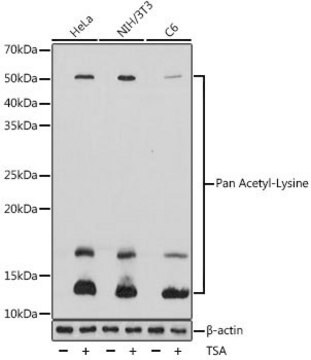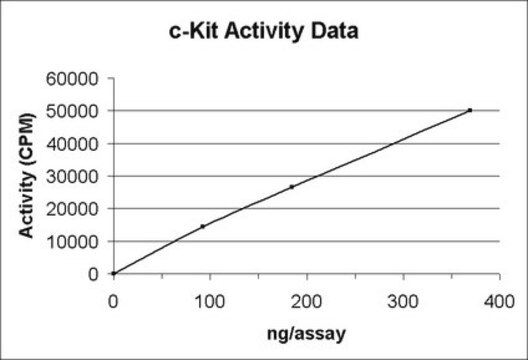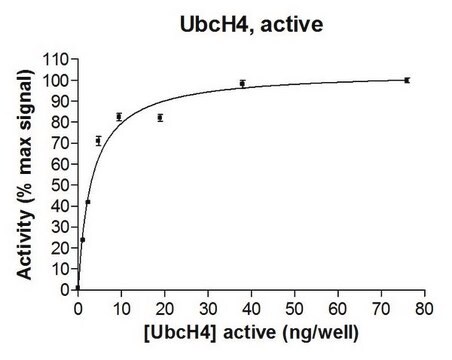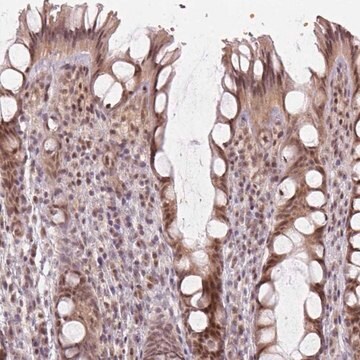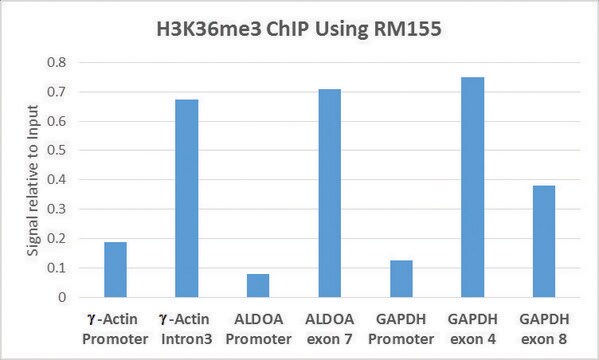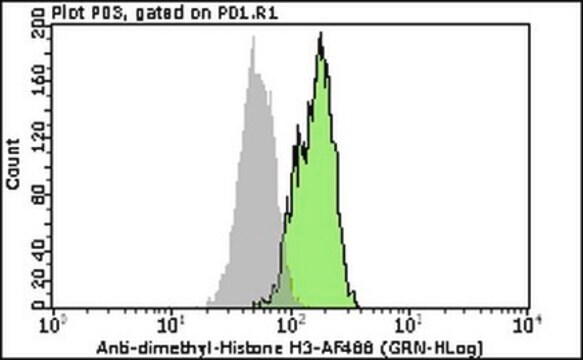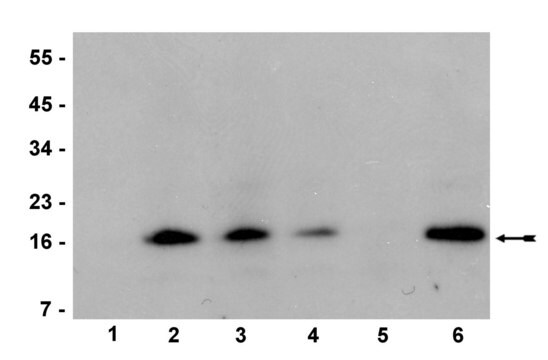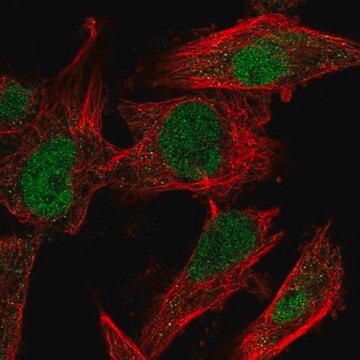17-10032
ChIPAb+ Trimethyl-Histone H3 (Lys36) - ChIP Validated Antibody and Primer Set, rabbit monoclonal
from rabbit
동의어(들):
H3K36me3, Histone H3 (tri methyl K36), H3 histone family, member T, histone 3, H3, histone cluster 3, H3
로그인조직 및 계약 가격 보기
모든 사진(4)
About This Item
UNSPSC 코드:
12352203
eCl@ss:
32160702
NACRES:
NA.32
추천 제품
일반 설명
All ChIPAb+ antibodies are individually validated for chromatin precipitation, every lot, every time. Each ChIPAb+ antibody set includes control primers (tested every lot by qPCR) to biologically validate your IP results in a locus-specific context. The qPCR protocol and primer sequences are provided, allowing researchers to validate ChIP protocols when using our antibody in their chromatin context. Each set also includes a negative control antibody to ensure specificity of the ChIP reaction.
The ChIPAb+ Trimethyl-Histone H3 (Lys36) set includes the Trimethyl-Histone H3 (Lys36) antibody, a negative control antibody (normal rabbit IgG), and qPCR primers which amplify a 147 bp region of human BDNF intron. The Trimethyl-Histone H3 (Lys36) and negative control antibodies are supplied in a scalable "per ChIP" reaction size and can be used to functionally validate the precipitation of Trimethyl-Histone H3 (Lys36)-associated chromatin.
The ChIPAb+ Trimethyl-Histone H3 (Lys36) set includes the Trimethyl-Histone H3 (Lys36) antibody, a negative control antibody (normal rabbit IgG), and qPCR primers which amplify a 147 bp region of human BDNF intron. The Trimethyl-Histone H3 (Lys36) and negative control antibodies are supplied in a scalable "per ChIP" reaction size and can be used to functionally validate the precipitation of Trimethyl-Histone H3 (Lys36)-associated chromatin.
Histones are highly conserved proteins that serve as the structural scaffold for the organization of nuclear DNA into chromatin. The four core histones, H2A, H2B, H3, and H4, assemble into an octamer (2 molecules of each). Subsequently, 146 base pairs of DNA are wrapped around the octamer, forming a nucleosome, the basic subunit of chromatin. Histones are modified post-translationally by the actions of enzymes in both the nucleus and cytoplasm. These modifications regulate DNA transcription, repair, recombination, and replication. The most commonly studied modifications are acetylation, phosphorylation, methylation, and ubiquitination. These modifications can alter local chromatin architecture, or recruit trans-acting factors that recognize specific histone modifications (the "histone code" hypothesis). The modifications occur predominantly on the N-terminal and C-terminal tails that extend beyond the nucleosome core particle. Methylation of histone H3 on Lys36 (H3K36me2/3) is tightly associated with actively transcribed genes, and this modification is found primarily within the coding region, suggesting H3K36 methylation is necessary for efficient RNA polymerase II elongation and processivity.
특이성
Recognizes Trimethyl-Histone H3 (Lys36), Mr ~17 kDa.
Wide reactivity with other species is expected.
면역원
Epitope: Trimethylated Lys36
KLH-conjugated, synthetic peptide containing the sequence ....GVme3KKP…, in which me3K corresponds to human trimethyl-histone H3 (Lys36).
애플리케이션
Chromatin Immunoprecipitation:
Sonicated chromatin prepared from HeLa cells (1 X 106 cell equivalents per IP) were subjected to chromatin immunoprecipitation using 2 µg of either Normal rabbit IgG or 2 µL Anti-trimethyl-Histone H3 (Lys36) and the Magna ChIP A Kit (Cat. # 17-610). Successful immunoprecipitation of trimethyl-Histone H3 (Lys36) associated DNA fragments was verified by qPCR using ChIP Primers, BDNF Intron as a positive locus, and GAPDH promoter primers as a negative locus (Please see figures). Data is presented as percent input of each IP sample relative to input chromatin for each amplicon and ChIP sample as indicated.
Please refer to the EZ-Magna ChIP A (Cat. # 17-408) or EZ-ChIP (Cat. # 17-371) protocol for experimental details.
Western Blot Analysis and Peptide Inhibition:
Representative lot data.
Recombinant Histone H3 (Catalog # 14-411, lane 1) and chicken Core Histones (Catalog # 13-107, lane 2) were resolved by electrophoresis, transferred to nitrocellulose and probed with antitrimethyl-Histone H3 (Lys36) (1:1000 dilution) or anti-trimethyl-Histone H3 (Lys36) pre-adsorbed with 1mM histone H3 peptides containing the following modifications:
Lane 3: monomethyl-lysine 36
Lane 4: dimethyl-lysine 36
Lane 5: trimethyl-lysine 36
Lane 6: unmodified
Proteins were visualized using a goat anti-rabbit secondary antibody conjugated to HRP and a chemiluminescence detection system. (Please see figures).
Peptide Dot Blot Analysis:
Representative lot data.
A dilution series of Histone H3 peptides containing the following modifications was made:
Column 1: unmodified
Column 2: monomethyl-lysine 36
Column 3: dimethyl-lysine 36
Column 4: trimethyl-lysine 36
2 μL of each dilution was spotted onto a PVDF membrane and probed with antitrimethyl-Histone H3 (Lys36), (1:1000 dilution).
Peptides were visualized using a goat anti-rabbit secondary conjugated to HRP and a chemiluminescence detection system (Please see figures).
Sonicated chromatin prepared from HeLa cells (1 X 106 cell equivalents per IP) were subjected to chromatin immunoprecipitation using 2 µg of either Normal rabbit IgG or 2 µL Anti-trimethyl-Histone H3 (Lys36) and the Magna ChIP A Kit (Cat. # 17-610). Successful immunoprecipitation of trimethyl-Histone H3 (Lys36) associated DNA fragments was verified by qPCR using ChIP Primers, BDNF Intron as a positive locus, and GAPDH promoter primers as a negative locus (Please see figures). Data is presented as percent input of each IP sample relative to input chromatin for each amplicon and ChIP sample as indicated.
Please refer to the EZ-Magna ChIP A (Cat. # 17-408) or EZ-ChIP (Cat. # 17-371) protocol for experimental details.
Western Blot Analysis and Peptide Inhibition:
Representative lot data.
Recombinant Histone H3 (Catalog # 14-411, lane 1) and chicken Core Histones (Catalog # 13-107, lane 2) were resolved by electrophoresis, transferred to nitrocellulose and probed with antitrimethyl-Histone H3 (Lys36) (1:1000 dilution) or anti-trimethyl-Histone H3 (Lys36) pre-adsorbed with 1mM histone H3 peptides containing the following modifications:
Lane 3: monomethyl-lysine 36
Lane 4: dimethyl-lysine 36
Lane 5: trimethyl-lysine 36
Lane 6: unmodified
Proteins were visualized using a goat anti-rabbit secondary antibody conjugated to HRP and a chemiluminescence detection system. (Please see figures).
Peptide Dot Blot Analysis:
Representative lot data.
A dilution series of Histone H3 peptides containing the following modifications was made:
Column 1: unmodified
Column 2: monomethyl-lysine 36
Column 3: dimethyl-lysine 36
Column 4: trimethyl-lysine 36
2 μL of each dilution was spotted onto a PVDF membrane and probed with antitrimethyl-Histone H3 (Lys36), (1:1000 dilution).
Peptides were visualized using a goat anti-rabbit secondary conjugated to HRP and a chemiluminescence detection system (Please see figures).
Research Category
Epigenetics & Nuclear Function
Epigenetics & Nuclear Function
Research Sub Category
Histones
Histones
This ChIPAb+ Trimethyl-Histone H3 (Lys36) -ChIP Validated Antibody & Primer Set conveniently includes the antibody & the specific control PCR primers.
포장
25 assays per set. Recommended use: ~2 μL of antibody per chromatin immunoprecipitation (dependent upon biological context).
품질
Chromatin Immunoprecipitation:
Sonicated chromatin prepared from HeLa cells (1 X 106 cell equivalents per IP) were subjected to chromatin immuno-precipitation using 2 µg of either Normal Rabbit IgG or 2 µL Anti-trimethyl-Histone H3 (Lys36) and the Magna ChIP® A Kit (Cat. # 17-610).
Successful immunoprecipitation of trimethyl-Histone H3 (Lys36) associated DNA fragments was verified by qPCR using ChIP Primers, BDNF Intron (Please see figures).
Please refer to the EZ-Magna ChIP A (Cat. # 17-408) or EZ-ChIP (Cat. # 17-371) protocol for experimental details.
Sonicated chromatin prepared from HeLa cells (1 X 106 cell equivalents per IP) were subjected to chromatin immuno-precipitation using 2 µg of either Normal Rabbit IgG or 2 µL Anti-trimethyl-Histone H3 (Lys36) and the Magna ChIP® A Kit (Cat. # 17-610).
Successful immunoprecipitation of trimethyl-Histone H3 (Lys36) associated DNA fragments was verified by qPCR using ChIP Primers, BDNF Intron (Please see figures).
Please refer to the EZ-Magna ChIP A (Cat. # 17-408) or EZ-ChIP (Cat. # 17-371) protocol for experimental details.
표적 설명
~17 kDa
물리적 형태
Anti-Trimethyl-Histone H3 (Lys36) (rabbit monoclonal IgG). One vial containing 50 μL of protein A purified IgG in a solution containing 0.07 M Tris-glycine, 0.105 M NaCl, pH 7.4, 0.035% sodium azide and 30% glycerol. Store at -20°C.
Normal Rabbit IgG. One vial containing 125 µg Rabbit IgG in 125 µL of storage buffer containing 0.05% sodium azide. Store at -20°C.
ChIP Primers, BDNF Intron. One vial containing 75 μL of 5 μM of each primer specific for human BDNF intron. Store at -20°C.
FOR: ACCCCAACCTCTAACAGCATTA
REV: TGTCTCTCAGCAGTCTTGCATT
Normal Rabbit IgG. One vial containing 125 µg Rabbit IgG in 125 µL of storage buffer containing 0.05% sodium azide. Store at -20°C.
ChIP Primers, BDNF Intron. One vial containing 75 μL of 5 μM of each primer specific for human BDNF intron. Store at -20°C.
FOR: ACCCCAACCTCTAACAGCATTA
REV: TGTCTCTCAGCAGTCTTGCATT
Format: Purified
Protein A purified
저장 및 안정성
Stable for 1 year at -20°C from date of receipt. Handling Recommendations: Upon first thaw, and prior to removing the cap, centrifuge the vial and gently mix the solution. Aliquot into microcentrifuge tubes and store at -20°C. Avoid repeated freeze/thaw cycles, which may damage IgG and affect product performance. Note: Variability in freezer temperatures below -20°C may cause glycerol containing solutions to become frozen during storage.
분석 메모
Control
Includes negative control rabbit IgG antibody and primers specific for human BDNF Intron.
Includes negative control rabbit IgG antibody and primers specific for human BDNF Intron.
법적 정보
MAGNA CHIP is a registered trademark of Merck KGaA, Darmstadt, Germany
UPSTATE is a registered trademark of Merck KGaA, Darmstadt, Germany
면책조항
Unless otherwise stated in our catalog or other company documentation accompanying the product(s), our products are intended for research use only and are not to be used for any other purpose, which includes but is not limited to, unauthorized commercial uses, in vitro diagnostic uses, ex vivo or in vivo therapeutic uses or any type of consumption or application to humans or animals.
Storage Class Code
10 - Combustible liquids
시험 성적서(COA)
제품의 로트/배치 번호를 입력하여 시험 성적서(COA)을 검색하십시오. 로트 및 배치 번호는 제품 라벨에 있는 ‘로트’ 또는 ‘배치’라는 용어 뒤에서 찾을 수 있습니다.
Jing Yang et al.
Evidence-based complementary and alternative medicine : eCAM, 2019, 6479136-6479136 (2019-07-06)
The incidence of cardiac dysfunction after myocardial infarction (MI) continues to increase despite advances in treatment. Excessive myocardial fibrosis plays a vital role in the development of adverse cardiac remodeling and deterioration of cardiac function. Understanding the molecular and cellular
The Phaseolus vulgaris PvTRX1h gene regulates plant hormone biosynthesis in embryogenic callus from common bean.
Barraza, A; Cabrera-Ponce, JL; Gamboa-Becerra, R; Luna-Martinez, F; Winkler, R; Alvarez-Venegas, R
Frontiers in Plant Science null
Anurag Kulkarni et al.
Cell chemical biology, 24(11), 1377-1387 (2017-10-03)
The human retrovirus HTLV-1 causes a hematological malignancy or neuroinflammatory disease in ∼10% of infected individuals. HTLV-1 primarily infects CD4+ T lymphocytes and persists as a provirus integrated in their genome. HTLV-1 appears transcriptionally latent in freshly isolated cells; however
Keren Martínez-Aguilar et al.
Frontiers in plant science, 7, 653-653 (2016-06-01)
To survive in adverse conditions, plants have evolved complex mechanisms that "prime" their defense system to respond and adapt to stresses. Their competence to respond to such stresses fundamentally depends on its capacity to modulate the transcriptome rapidly and specifically.
Diane Frankel et al.
iScience, 25(2), 103757-103757 (2022-02-05)
Hutchinson-Gilford progeria syndrome (HGPS) is a rare genetic disorder, in which an abnormal and toxic protein called progerin, accumulates in cell nuclei, leading to major cellular defects. Among them, chromatin remodeling drives gene expression changes, including miRNA dysregulation. In our
자사의 과학자팀은 생명 과학, 재료 과학, 화학 합성, 크로마토그래피, 분석 및 기타 많은 영역을 포함한 모든 과학 분야에 경험이 있습니다..
고객지원팀으로 연락바랍니다.